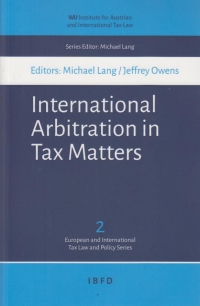Record Detail Back

International Arbitration in Tax Matters
The last two decades have seen an unprecedented integration of national economies, the emergence of new players and the growth of global corporations. These forces of globalization have an impact on all aspects of economic life. Tax has not been immune to these pressures – it has become increasingly challenging to operate national tax systems in a borderless world. Politicians, the press and citizens have engaged in an intense debate on whether multinational enterprises (MNEs) are paying their fair share of the tax burden and whether the tax they pay in each of the jurisdictions in which they operate reflects where the value is created. All these developments have been accompanied by an intensification of tax competition, with countries using their tax systems to attract increasingly mobile economic activities. The lack of a globally accepted set of rules to govern the taxation of MNEs has led to a very significant increase in cross-border tax disputes. Yet, little has changed in the way that governments try to resolve them. The mutual agreement procedures (MAPs) found in tax treaties are the main mechanism to resolve such disputes. Despite some improvements in the MAP process, a MAP is slow and the number of unresolved cases continues to grow, which has led to an increase in unrelieved double taxation. In today’s uncertain economic environment, MNEs have the right to expect that differences of views between national tax authorities will be resolved in a principled and timely manner. This publication brings together the main papers discussed at a conference in January 2015 at the Vienna University of Economics and Business (WU). It examines the concerns put forward against arbitration and explores possible solutions. This book aims to contribute to the ongoing debate on how to resolve cross-border tax disputes.
16 INT mic A2
9789087223410
16 INT mic A2
Book
English
IBFD
2015
The Netherlands
xxiv, 481 p, 23 cm
LOADING LIST...
LOADING LIST...



